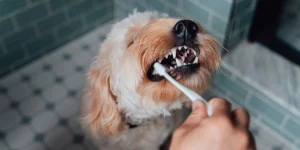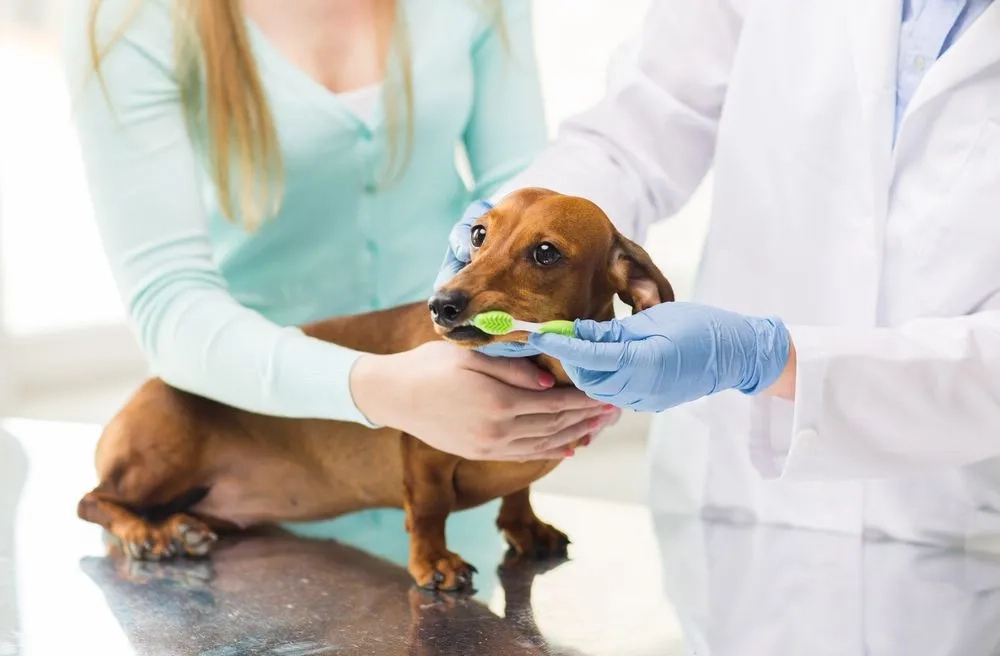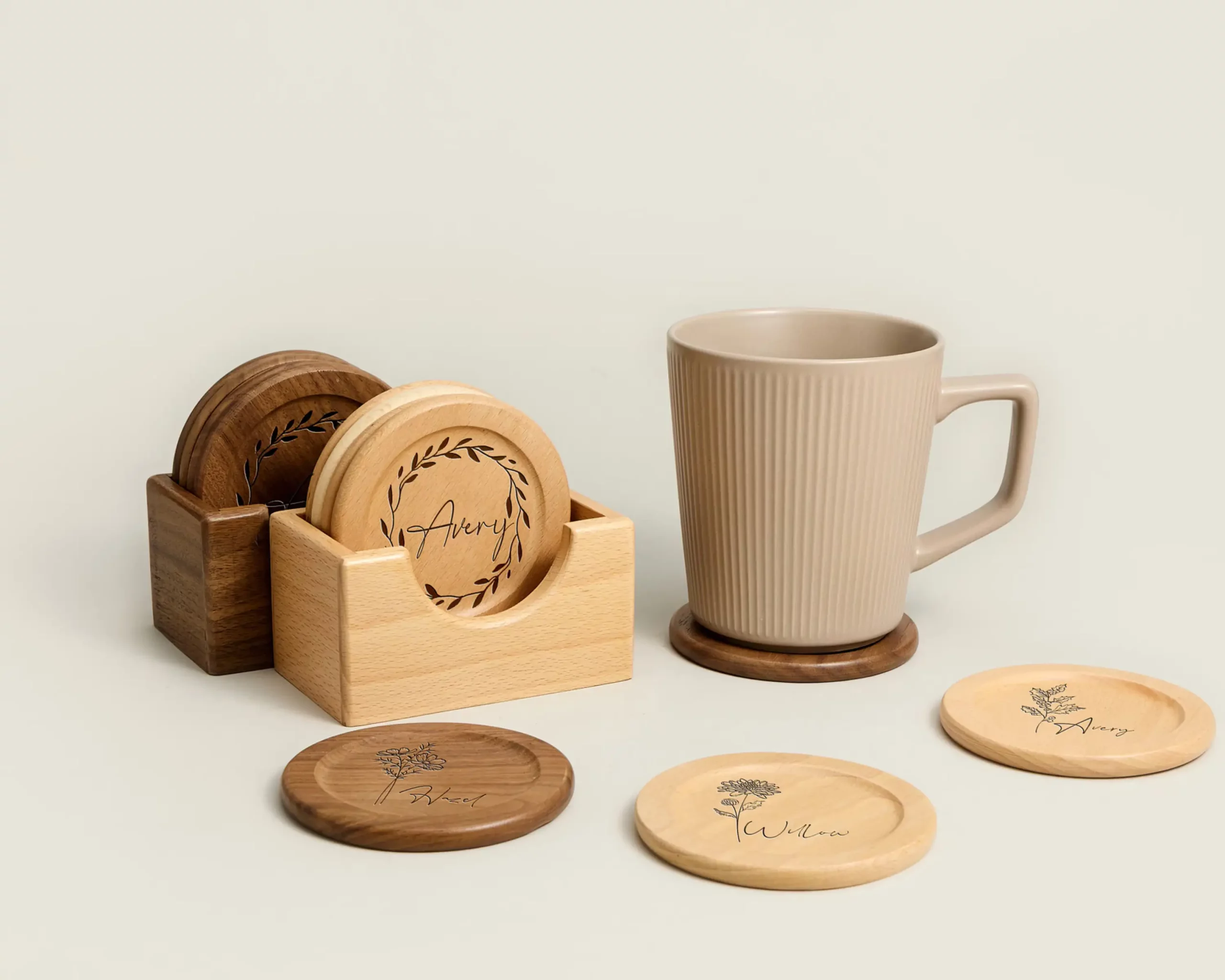Maintaining a dog’s dental health is vital for overall well-being. Neglecting oral care can lead to significant health issues, including periodontal disease and systemic infections. Establishing a daily dental routine can mitigate these risks. This process involves integrating simple habits that foster cooperation and routine. Understanding the essential components of a thorough dental regimen may reveal surprising benefits for both the dog and owner. What specific practices contribute to this essential routine?
Key Takeaways
- Establish a consistent dental care routine by integrating it into daily activities to promote predictability for both you and your dog.
- Use dog-specific toothpaste and dental chews to enhance oral hygiene and satisfy your pet’s natural chewing instincts.
- Schedule regular veterinary check-ups to detect dental issues early and maintain your dog’s overall health.
- Employ positive reinforcement techniques to make dental care a fun and enjoyable experience for your dog.
- Regular dental routines improve digestion, freshen breath, and support heart and kidney health, contributing to a balanced lifestyle.
Understanding the Importance of Dog Dental Health
Dental health is a critical component of overall well-being in dogs. Regular maintenance through a dog dental health routine can prevent plaque buildup, gingivitis, and periodontal disease, which are common yet often overlooked issues. Owners should prioritize daily dental care, including brushing with pet-safe toothpaste, providing dental chews, and scheduling professional cleanings. These practices not only enhance oral hygiene but also contribute considerably to a dog’s longevity and quality of life. A consistent dog dental health care fosters a sense of community among pet owners who understand the importance of proactive care. By investing time and effort into their dog’s dental health, owners can cultivate a bond that guarantees their beloved companions lead healthier, happier lives.
Common Dental Issues in Dogs and Their Impact
Oral health issues in dogs can manifest in various forms, greatly affecting their overall well-being. Common dental problems include periodontal disease, which leads to gum inflammation and tooth loss, and dental caries, characterized by tooth decay. Additionally, tartar buildup can result in bad breath and discomfort, complicating the dog’s ability to eat and enjoy life. These conditions not only impact oral health but can also lead to systemic complications, such as heart and kidney disease. Recognizing the signs of dental distress, including changes in eating habits or excessive drooling, is vital for pet owners. Establishing a proactive dog dental health routine can mitigate these issues and markedly enhance a dog’s quality of life, fostering a sense of belonging for both pets and their families.

Essential Steps for a Comprehensive Dog Dental Health Routine
Maintaining ideal dental health in dogs necessitates a structured approach. A thorough dog dental health routine should encompass several essential steps to guarantee peak oral hygiene and overall well-being.
- Regular Brushing: Daily brushing with dog-specific toothpaste helps remove plaque and prevent tartar buildup.
- Dental Chews: Offering dental chews can aid in mechanically cleaning teeth while also satisfying chewing instincts.
- Routine Veterinary Check-ups: Regular dental examinations by a veterinarian allow for early detection and treatment of potential issues.
- Professional Cleanings: Scheduling professional cleanings as recommended by a veterinarian is vital for maintaining long-term dental health.
Implementing these steps fosters a proactive attitude towards a dog’s dental care, contributing to a balanced lifestyle for both the pet and its owner.
Tips for Making Dental Care a Daily Habit
Establishing a consistent dog dental health routine is essential for ensuring long-term oral hygiene and overall wellness. To make dental care a daily habit, pet owners should integrate it into existing routines, such as pairing tooth brushing with morning or evening activities. Consistency can be reinforced by using a specific time and location for dental care, creating a sense of predictability for both the owner and the dog. Utilizing positive reinforcement, such as treats or praise, can help associate dental care with positive experiences. Additionally, employing tools like flavored toothpaste or engaging dental toys can enhance the routine’s appeal. By fostering a routine that emphasizes regularity and enjoyment, owners can successfully maintain their dog’s dental health effectively and sustainably.
How a Healthy Dental Routine Contributes to Overall Dog Wellness
A consistent dog dental health routine plays a significant role in promoting overall dog wellness. Regular dental care helps prevent various health issues, ensuring a balanced lifestyle for pets. A robust routine not only maintains oral hygiene but also has a cascading effect on overall health.
- Reduces the risk of periodontal disease
- Enhances digestive health through better chewing
- Prevents bad breath and maintains fresh oral environment
- Supports heart and kidney health by minimizing bacteria
Frequently Asked Questions
How Often Should I Take My Dog to the Vet for Dental Check-Ups?
Veterinarians recommend taking dogs for dental check-ups at least once a year. However, dogs with dental issues or specific health concerns may require more frequent visits to guarantee ideal oral health and overall well-being.
Can Dog Dental Health Affect Their Behavior or Mood?
Dog dental health greatly impacts behavior and mood. Poor oral hygiene can lead to pain and discomfort, resulting in irritability, anxiety, or aggression. Regular dental care fosters overall well-being, enhancing both temperament and quality of life.
What Are the Signs of Dental Pain in Dogs?
Signs of dental pain in dogs include excessive drooling, difficulty eating, pawing at the mouth, bad breath, and changes in behavior such as increased aggression or withdrawal. Prompt veterinary attention is essential for proper diagnosis and treatment.
Are There Specific Dog Breeds Prone to Dental Issues?
Certain dog breeds, including small toy breeds, brachycephalic breeds, and those with overcrowded teeth, are more susceptible to dental issues. These predispositions necessitate proactive dental health routines to guarantee ideal oral hygiene and overall well-being.
Can I Use Human Toothpaste for My Dog’s Dental Care?
Using human toothpaste for a dog’s dental care is not recommended. It contains xylitol and other substances harmful to dogs. A proper dog dental health routine should utilize toothpaste specifically formulated for canine use to guarantee safety.
Conclusion
In summary, establishing a daily dental health routine for dogs is essential for preventing common dental issues and promoting overall well-being. By integrating practices such as regular brushing, dental chews, and veterinary check-ups into a pet’s daily life, owners can enhance their dog’s oral hygiene while fostering a stronger bond. This proactive approach not only mitigates potential health risks but also contributes to a balanced lifestyle, ensuring a happier and healthier life for the canine companion.
You May Also Like To Read:





